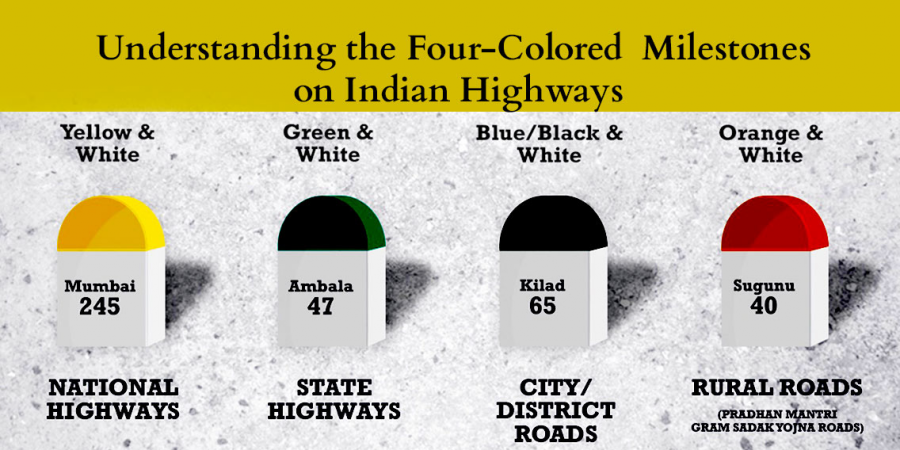

Indian highways are adorned with a unique feature that catches the eye of travelers - the four-colored milestones that dot the roadside landscape. These colorful markers serve a significant purpose beyond mere decoration, playing a crucial role in navigation, safety, and convenience for road users across the country. Let's delve into the reasons behind the distinct hues of these milestones and their importance on Indian roads.
1. Historical Significance :
The tradition of using colored milestones dates back to ancient times when different colors were employed to mark important routes and distances.
In India, this practice has evolved over centuries, adapting to modern transportation needs while retaining its historical roots.
2. Identification of National Highways :
Each color on the milestone corresponds to a specific category of road, primarily indicating National Highways (NH), State Highways (SH), Major District Roads (MDR), and Other Roads.
This color-coded system aids travellers in quickly identifying the type of road they are on and the level of connectivity it offers.
3. Yellow & White Strip for National Highways (NH) :
Yellow & White Strip colored milestones signify National Highways, which are vital arteries of the country's road network, connecting major cities and regions.
National Highways play a crucial role in interstate commerce, tourism, and transportation of goods and passengers over long distances.
4. Green for State Highways (SH) :
Green markers denote State Highways, which link important cities, towns, and regions within a state.
State Highways serve as lifelines for intra-state travel and facilitate economic development by improving connectivity to rural and urban areas.
5. Blue or Black & White strips for Major District Roads (MDR) :
Blue or Black & White strips milestones represent Major District Roads, which connect district headquarters with important towns, villages, and economic centers within a district.
Major District Roads play a vital role in local transportation, facilitating access to markets, healthcare, education, and other essential services.
6. Orange & White strips for Other Roads :
Orange & White strips colored milestones designate Other Roads, including rural roads, village roads, and local streets that are not part of the National or State Highway network.
These roads serve primarily local traffic and play a crucial role in rural connectivity and development.
Conclusion :
The four-colored milestones adorning Indian highways are more than just colorful markers; they are symbols of a well-organized road network that spans the length and breadth of the country. From the bustling National Highways to the tranquil village roads, each color represents a different facet of India's diverse transportation landscape.
By understanding the significance of these colors, travelers can navigate the vast expanse of Indian roads with ease, knowing which route leads to their destination. Moreover, the color-coded milestone system underscores the government's commitment to improving road infrastructure and enhancing road safety for all users.
As we journey along the highways adorned with these colorful markers, let us appreciate the role they play in guiding our paths, connecting us to new destinations, and weaving the fabric of our nation's transportation network.
